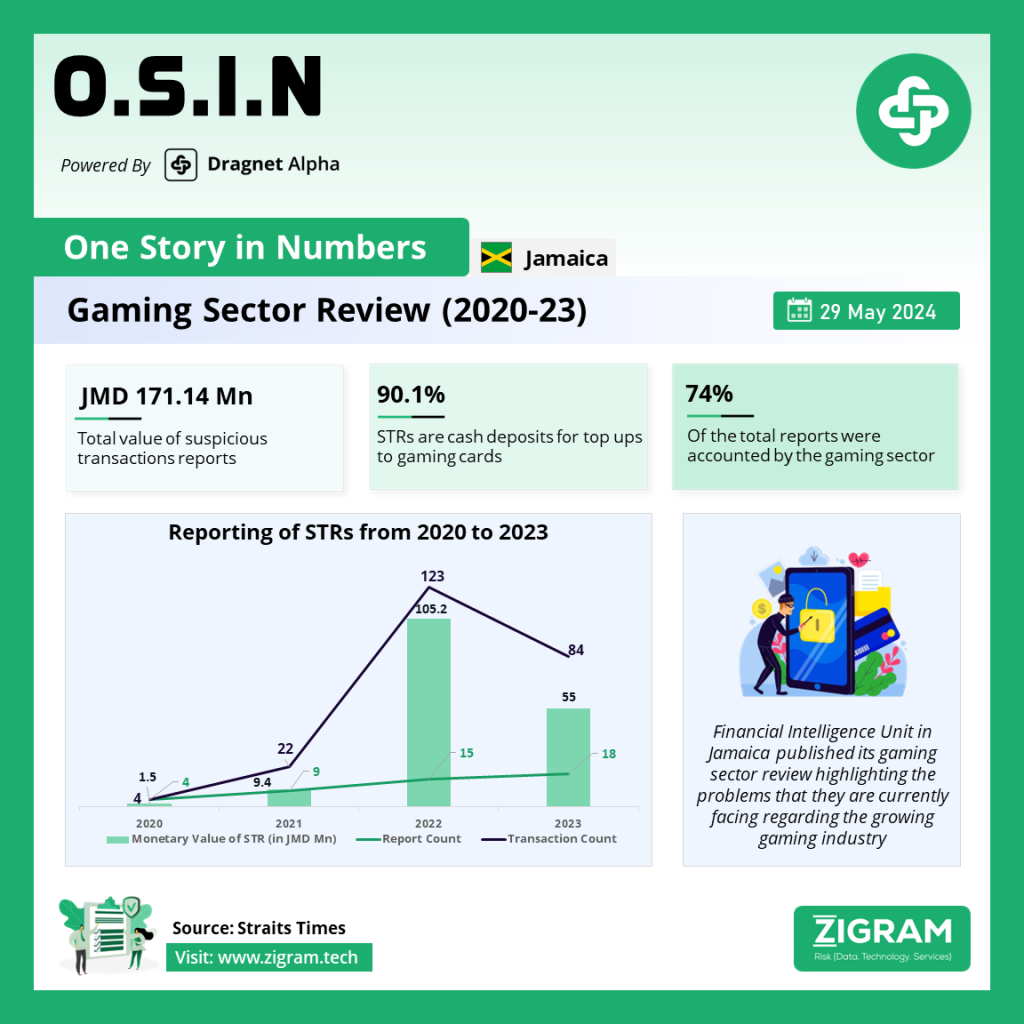Published Date:
The Jamaican gaming sector, particularly the gaming lounge sub-sector, has shown dynamic trends in financial reporting and suspicious activities from January 2020 to December 2023. This comprehensive review highlights the key statistics, nature of transactions, and emerging trends within this period, providing a detailed overview of the sector’s financial landscape.
Reporting and Transaction Statistics
Between 2020 and 2023, the gaming lounge sector, part of the Designated Non-Financial Institutions (DNFIs) reporting group, submitted a total of 110 reports, which include Suspicious Transaction Reports (STRs), Suspicious Activity Reports (SARs), and Authorized Disclosure (Request for Consent) Reports (ADRs). The gaming sector alone accounted for approximately 74% of these reports, indicating a significant focus on monitoring and compliance within this industry.
Out of the 13 reporting entities in the gaming sector, nine contributed to the 81 STRs submitted over the four-year period. The year 2022 marked the peak with 34 reports, a notable increase compared to 12 reports each in 2020 and 2021, and 23 reports in 2023.
Monetary Value and Transaction Types
The 81 STRs submitted involved 233 transactions, totaling approximately J$171.1 million. Cash deposits for gaming card top-ups constituted 90.1% (J$154.3 million) of this total. The distribution of these transactions over the years is as follows:
– 2020: 4 reports, J$1.5 million
– 2021: 9 reports, J$9.4 million
– 2022: 15 reports, J$105.2 million
– 2023: 18 reports, J$55 million
The dominant payment method was cash deposits, reflecting a preference for liquidity in gaming transactions. Electronic transfers and debit/credit card transactions were also noted but to a lesser extent.
Indicators and Reasons for Suspicion
Key indicators triggering the STRs included:
– Adverse media reports
– Use of gaming for money laundering
– Activity not matching client profiles
– Fraud
The total monetary values associated with these indicators varied, with the highest being J$62.8 million linked to account monitoring and J$36.4 million to adverse media reports. Reports citing money laundering totaled J$17.1 million, showcasing significant concern regarding the potential misuse of gaming facilities for illicit financial activities.
Detailed Suspicion Categories
The review identified specific trends under various suspicion categories:
– Unusual Transaction Activity: Large cash deposits inconsistent with client profiles, minimal gaming activity followed by cash-outs, and attempts to bypass AML systems using multiple game cards.
– Debit/Credit Card Fraud: Attempts to top-up gaming cards with fraudulent cards, reflecting significant vulnerabilities in payment systems.
– Money Laundering (Gaming): Use of third-party credit cards, particularly international cards, for top-ups, and subsequent cash withdrawals.
– Adverse Media Reports: Cases involving individuals with legal issues ranging from fraud to money laundering, often flagged due to their high-risk profiles.
Profile of Reported Subjects
The 81 reports captured data on 68 individual gamers, with a predominant majority being Jamaican nationals (94%). Notably, Kingston & St. Andrew accounted for 40% of the reported gamers, emphasizing regional hotspots for gaming activities.
The period from 2020 to 2023 saw significant activity within Jamaica’s gaming sector, with a notable increase in suspicious transaction reporting in 2022. The predominance of cash transactions highlights potential risks for money laundering and fraud, necessitating stringent monitoring and regulatory oversight. The insights from this review underscore the importance of robust anti-money laundering measures and the need for continuous vigilance in the gaming industry.
Read the full report here.
- #JamaicaGamingSector
- #FinancialReview
- #GamingLounge
- #SuspiciousTransactions
- #MoneyLaunderingPrevention
- #AML
- #GamingIndustry
- #FinancialCompliance
- #CashTransactions
- #FraudDetection
- #GamingTrends
